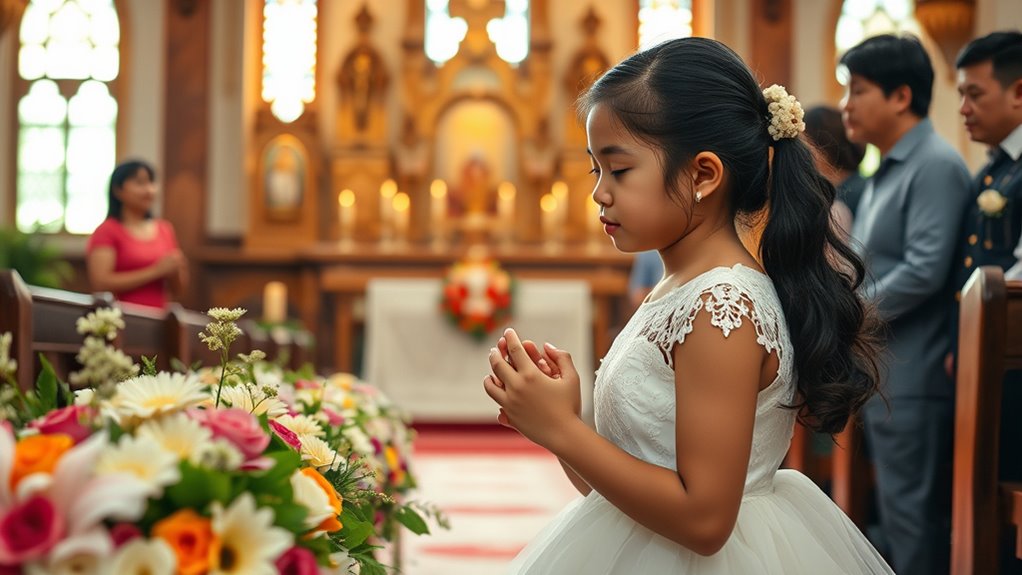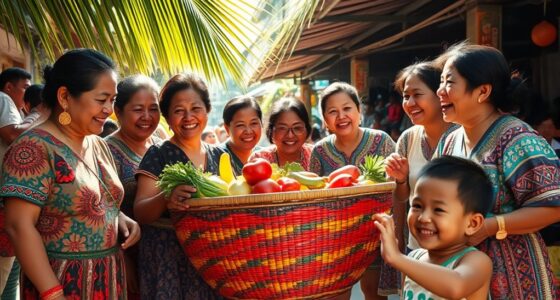Religion plays a significant role in shaping Filipina views on love and marriage. Largely influenced by Catholic teachings, relationships emphasize commitment, fidelity, and community support. Islamic principles promote structured courtship, while Protestantism encourages egalitarian partnerships. Even Buddhist perspectives contribute to the understanding of ethical love. As younger generations adapt to modern influences, personal happiness often takes precedence, signaling a cultural shift. Explore how these different beliefs shape relationship dynamics and experiences.
Key Takeaways
- Catholic teachings emphasize commitment and fidelity, shaping Filipina views on marriage as a sacred and lifelong bond.
- Islamic principles promote family involvement and honor in relationships, influencing perceptions of love and marriage among Muslim Filipinas.
- Protestantism encourages egalitarian views on marriage, fostering partnership and equality, which resonate with modern Filipina beliefs.
- Cultural shifts towards secularism lead younger Filipinas to prioritize personal happiness over traditional religious teachings in love and marriage.
- Emotional well-being and financial stability are increasingly recognized as vital factors in shaping relationships and marriage decisions among Filipinas.
Predominant Catholic Influence on Love and Marriage
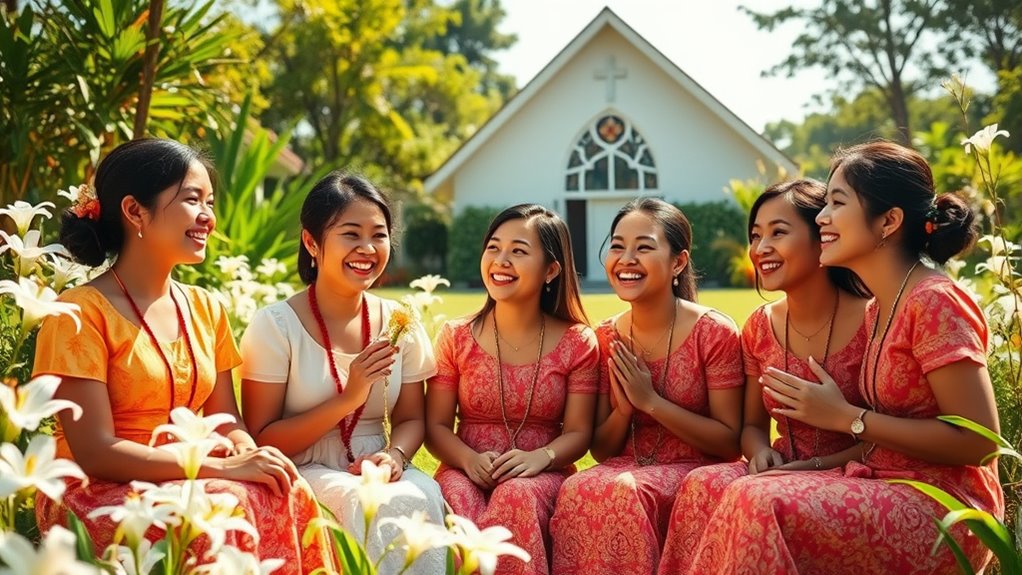
While many cultures shape views on love and marriage, the predominant Catholic influence in the Philippines plays a crucial role in defining these concepts.
Catholic teachings stress commitment and fidelity, making marriage a sacred bond. You’ll often find couples attending Pre-Cana seminars, which prepare them for married life by discussing family planning and ethical issues.
The Church’s teachings discourage artificial contraception in favor of Natural Family Planning, impacting family size and dynamics. This sacramental view of marriage fosters a lifelong commitment, affecting perceptions of divorce.
The Church’s stance on contraception and marriage fosters lifelong commitment and shapes views on family dynamics and divorce.
Additionally, the importance of community and extended family ties reinforces these values, as traditions like *pamanhikan* highlight the significance of family alliances in Filipino culture.
Islamic Principles Guiding Filipino Muslim Relationships
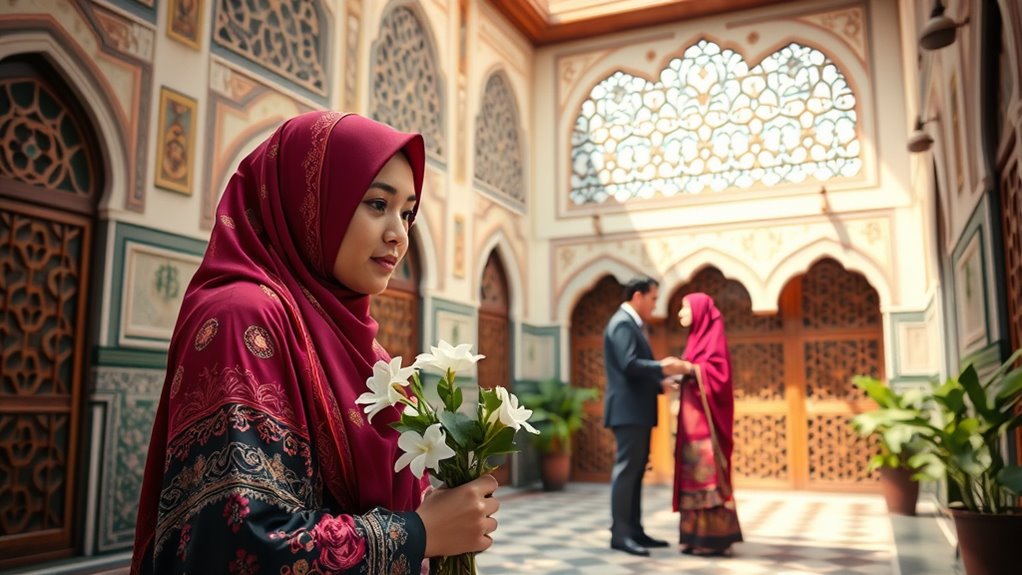
The influence of religion extends beyond Catholic teachings in the Philippines, shaping the views of Filipino Muslims on love and marriage through Islamic principles.
In this regard, nikah is seen as a sacred bond that provides a structured environment for family life. Courtship involves family intermediaries, emphasizing the importance of community and honor.
You’ll notice that traditional values like purity and modesty remain central, even amid modern influences. The Code of Muslim Personal Laws governs these relationships, ensuring adherence to Islamic guidelines.
It recognizes marriages between Muslims and non-Muslims while prioritizing mutual respect and ethical responsibilities. Ultimately, Islamic teachings advocate for relationships that enhance social harmony, fortifying familial and communal ties.
The Role of Protestantism in Shaping Love Perspectives

As Protestantism continues to grow in the Philippines, its influence on love and marriage becomes increasingly evident. This faith, comprising nearly 11% of the population, offers diverse perspectives on romantic relationships.
Protestant teachings encourage personal interpretation of biblical texts, emphasizing love as selfless and enduring. You’ll find that community support within Protestant groups fosters healthy dynamics in relationships.
Protestant teachings promote selfless love and community support, nurturing healthy relationship dynamics.
Additionally, the focus on personal faith often leads to more egalitarian views on marriage, promoting partnership and equality. With strong family values at the forefront, Protestantism shapes how you approach parenting and child-rearing.
As you navigate love, the fusion of Protestant beliefs with local traditions creates a unique understanding of romance and commitment in your life. Moreover, this community support plays a crucial role in reinforcing the values of love and commitment that are central to both faith and relationships.
Buddhist Approaches to Love and Marriage in the Philippines
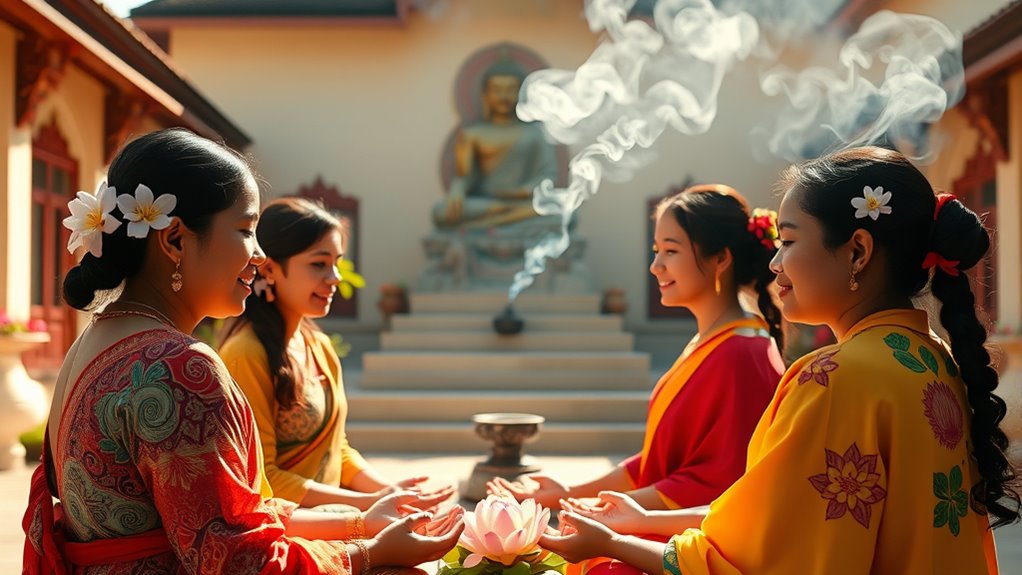
Protestant perspectives on love and marriage showcase a strong influence on Filipino culture, but you’ll also find that Buddhism offers a distinct approach to these topics. In the Philippines, Buddhism is a minority religion, yet its influence subtly shapes views on love and marriage.
Generally, marriage is seen as a secular activity, differing from the predominant Christian ceremonies. While monogamy is common, Buddhist teachings promote ethical guidelines like honesty and fidelity, fostering strong commitments.
You might appreciate how compassion and mindfulness enhance relationships, allowing for deeper emotional connections. The emphasis on mutual respect within families aligns with Filipino values, suggesting that Buddhist principles resonate within a broader cultural context, enriching your understanding of love and marriage.
The Rise of Non-Religious Views on Relationships

While traditional religious teachings have long influenced Filipino views on love and marriage, a noticeable shift is occurring among younger generations. Many young Filipinas are moving away from these teachings, prioritizing personal happiness and emotional connections over religious directives.
You might notice that premarital relationships are becoming more accepted, reflecting a broader cultural shift toward secularism. With declining church attendance, it’s clear that many are seeking alternatives to traditional beliefs.
Social media plays a significant role, offering diverse perspectives that challenge conservative ideals. As secularism gains traction, love and marriage are increasingly seen as personal choices, allowing you to explore relationships that align with your values rather than strictly adhering to religious expectations. This shift may parallel the experiences of those dealing with emotionally abusive husbands who often exploit traditional norms for control.
Community Support Through Faith Networks
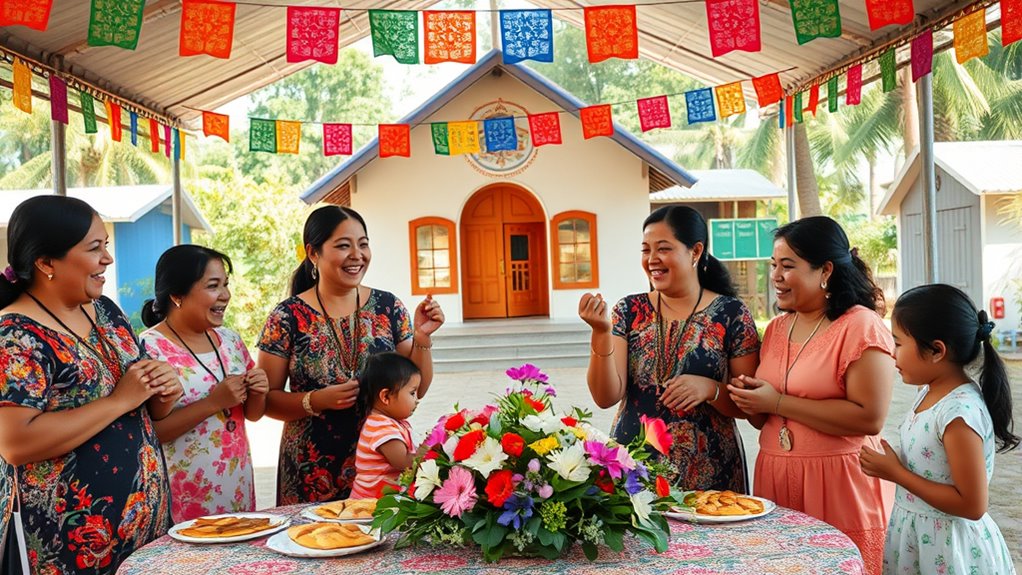
Community support through faith networks plays an essential role in shaping the experiences of couples steering love and marriage in the Philippines.
Churches provide premarital counseling that emphasizes the sanctity of marriage, guiding couples on their moral responsibilities. Religious ceremonies unite families and communities, blessing not just the couple but everyone involved.
By participating in church activities, couples build strong support networks that help them navigate challenges. Faith teachings promote forgiveness, turning conflicts into growth opportunities.
Additionally, faith-based groups organize events that strengthen relationships, while mentorship from experienced couples offers invaluable insights. Educational programs on family life further equip partners with essential skills, ensuring they’re prepared for a stable and committed marriage.
These networks cultivate resilience in marriages, making faith an integral part of their journey.
The Impact of Tradition on Filipino Courtship Practices
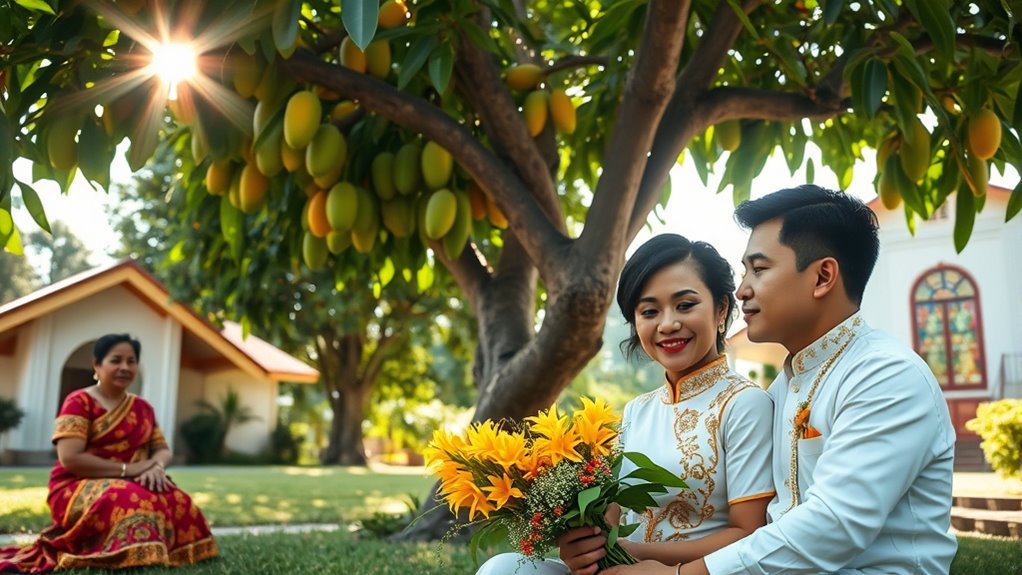
In Filipino culture, tradition profoundly shapes courtship practices, ensuring that familial involvement and approval remain central to the process. You’ll often find that courtship begins with *pamamanhikan*, where the suitor and his family formally meet the woman’s family to express intentions and seek blessings.
Early introductions highlight the collective nature of relationships, as participating in family events showcases your commitment. Traditional rituals like *harana*, where you serenade the woman, and *paninilbihan*, performing household tasks for her family, demonstrate dedication.
Communication may involve intermediaries to maintain respect, while playful teasing known as *tuksuhan* adds a light-hearted touch. Overall, these traditions reinforce values of respect, humility, and the importance of patience in building meaningful connections.
Modern Influences and Cultural Adaptation in Relationships
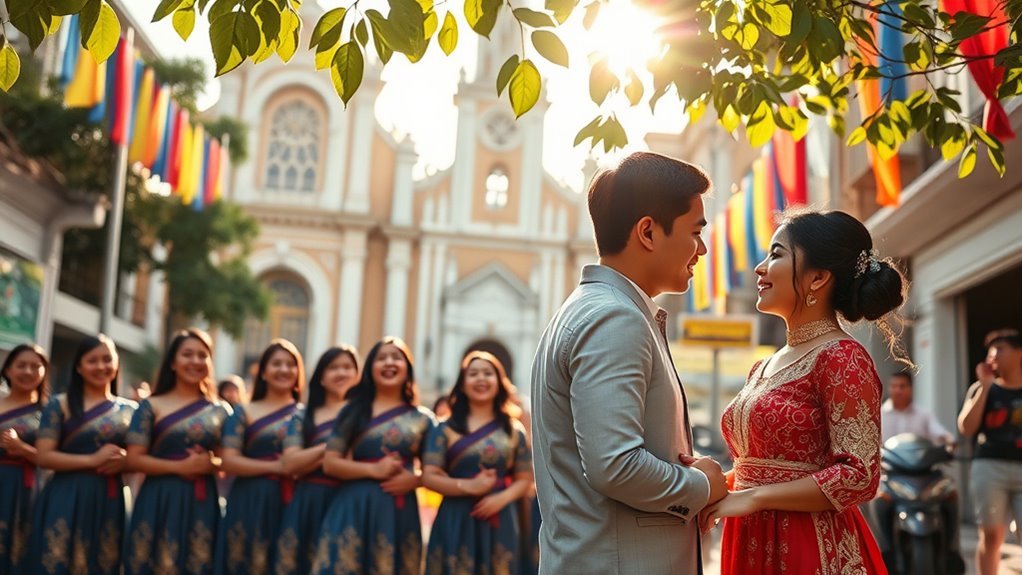
As globalization reshapes cultural landscapes, Filipinas find themselves steering the delicate balance between traditional values and modern expectations in relationships. Exposure to global cultures encourages younger generations to embrace individualistic values, while digital technology transforms how you connect with others. Moreover, the Filipina dating community provides a supportive network for navigating these changes.
In urban centers like Manila, more liberal dating attitudes emerge, influenced by Western media’s egalitarian views on gender roles. Yet, you still navigate family involvement and respect for tradition, especially in rural areas.
Intercultural relationships challenge old norms, prompting you to adapt and redefine love. As you balance these influences, the essence of respect and cultural heritage remains central, guiding your choices in a rapidly changing world. Minimalist environments promote a clearer understanding of personal values, which can further guide your approach to love and relationships.
Personal Faith and Its Role in Love and Marriage
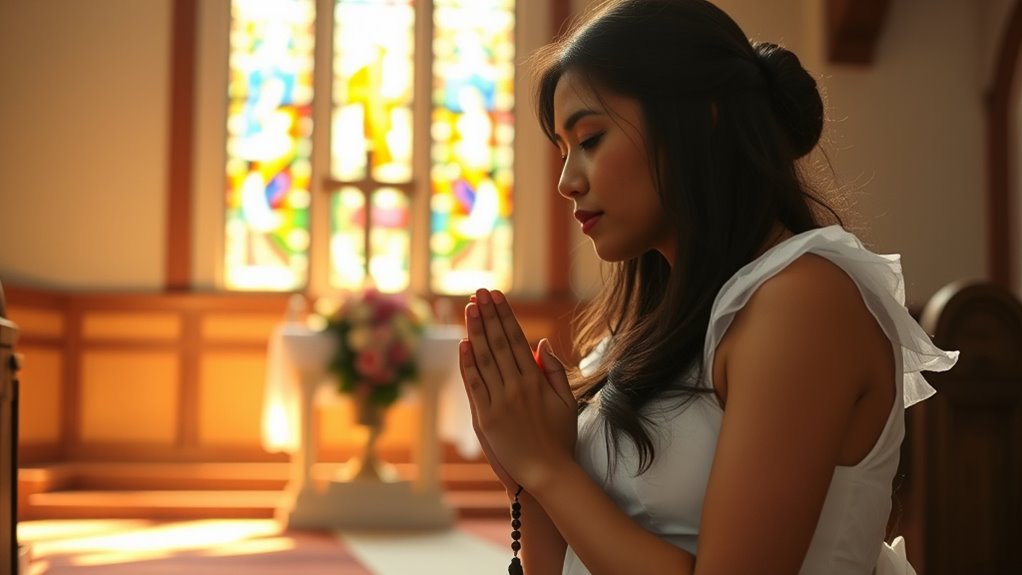
While personal faith often shapes your views on love and marriage, it intertwines with cultural values and family expectations. If you identify as Catholic, teachings greatly influence your perspective on relationships, emphasizing lifelong commitment and fidelity. Regular church attendance can provide communal support that strengthens your marriage. Moreover, understanding trust issues with boyfriends can help navigate relationship dynamics influenced by faith. Additionally, being aware of gaslighting tactics can empower you to recognize unhealthy patterns in your relationships. People with strong beliefs may also find themselves confronting emotional dysregulation, which can affect relationship stability. Furthermore, the role of state tax implications in financial planning may be an important consideration for couples as they approach retirement together.
Meanwhile, if your background includes other faiths, such as Islam or Protestantism, you might find varying traditions and practices enriching your understanding of love. Family and community play vital roles, guiding your choices and expectations. Additionally, evolving interpretations of religious teachings can provide more egalitarian views on gender roles within partnerships. Ultimately, your personal faith serves as a compass, guiding your decisions and shaping your beliefs about love and marriage. Understanding narcissistic behavior can also be essential in navigating relationships and ensuring emotional well-being.
Frequently Asked Questions
How Do Interfaith Relationships Navigate Cultural Traditions in the Philippines?
In the Philippines, interfaith relationships navigate cultural traditions by respecting each other’s beliefs and finding common ground.
You might choose to incorporate elements from both faiths into your ceremonies, creating a unique blend that honors both backgrounds.
Family involvement often plays a vital role, so open communication with loved ones is key.
Plus, community support through interfaith organizations can help foster understanding and acceptance, making the journey smoother for you as a couple.
What Are Common Challenges Faced by Non-Religious Filipinos in Relationships?
As a non-religious Filipino, you might face several challenges in relationships.
Family expectations can weigh heavily, as relatives often prefer partners who share their religious beliefs. You may also encounter social stigma, making it difficult to connect with those in religious circles.
Feelings of isolation or judgment from peers can impact your self-esteem, complicating relationship dynamics.
Steering through these obstacles often requires open communication and finding support within like-minded communities.
How Do Family Expectations Influence Individual Choices in Love and Marriage?
Family expectations profoundly influence your choices in love and marriage. You might find yourself consulting parents and elders before making decisions, as their approval often feels essential.
These cultural norms emphasize loyalty and respect, shaping your perspective on relationships. You may also experience pressure to prioritize family harmony over personal desires.
Ultimately, your decisions often reflect a balance between your individual preferences and your family’s expectations, creating a complex dynamic in your love life.
What Role Does Social Media Play in Modern Filipino Courtship Practices?
Social media plays an essential role in modern Filipino courtship practices. You can initiate connections through platforms like Instagram and dating apps, making it easier to express interest and maintain relationships.
These tools let you chat discreetly and gauge mutual feelings, shifting traditional gender roles. Family approval still matters, but technology allows for quicker communication, helping you navigate relationships more openly and effectively, especially during challenging times like the COVID-19 pandemic.
How Do Economic Factors Impact Views on Love and Marriage in the Philippines?
They say, “Love doesn’t pay the bills.”
In the Philippines, economic factors heavily influence your views on love and marriage. With rising costs of living, you might hesitate to commit, fearing financial instability.
Many opt for live-in arrangements to sidestep legal complications and expenses. As you navigate relationships, you’ll likely prioritize economic security alongside emotional fulfillment, reflecting a shift in what partnership means in today’s world.
Conclusion
In the vibrant tapestry of Filipino culture, religion weaves a significant thread, shaping how love and marriage are viewed. You might think that modern influences overshadow these beliefs, but imagine a couple, hand in hand, seeking guidance from their faith during a stormy moment. Their bond, strengthened by shared values and traditions, showcases how deeply ingrained principles can guide relationships even in today’s fast-paced world. Ultimately, love flourishes when anchored in faith and community support.
